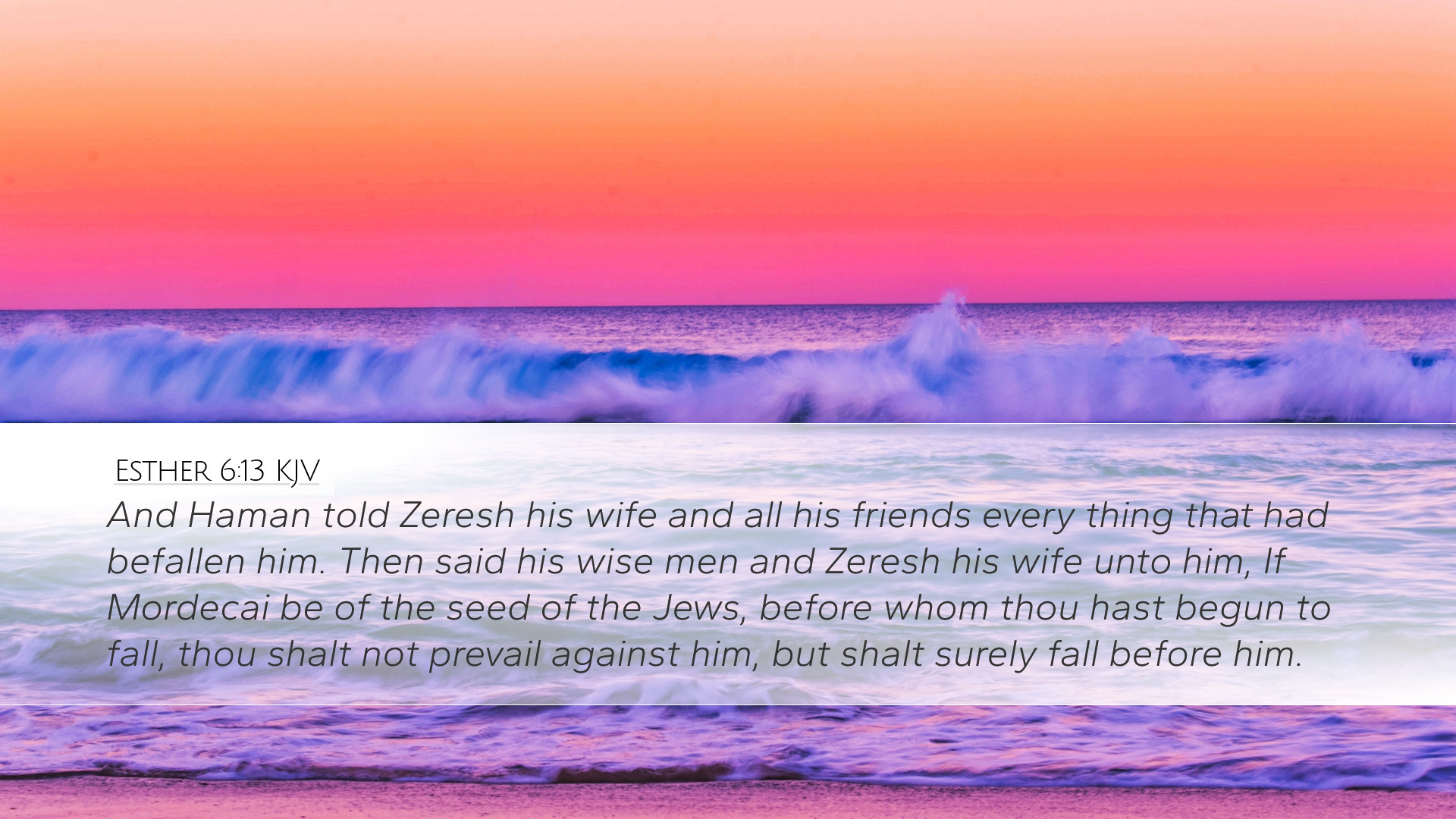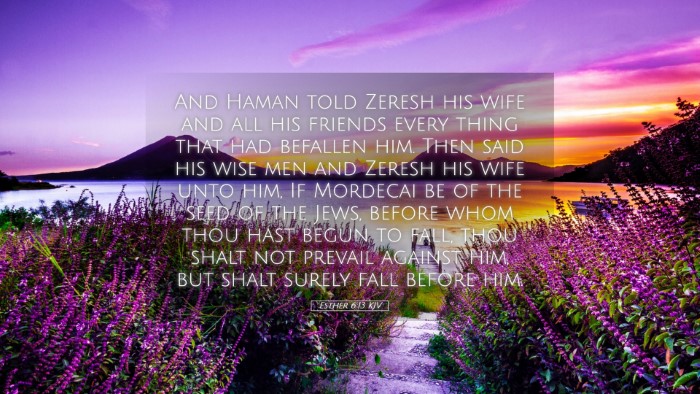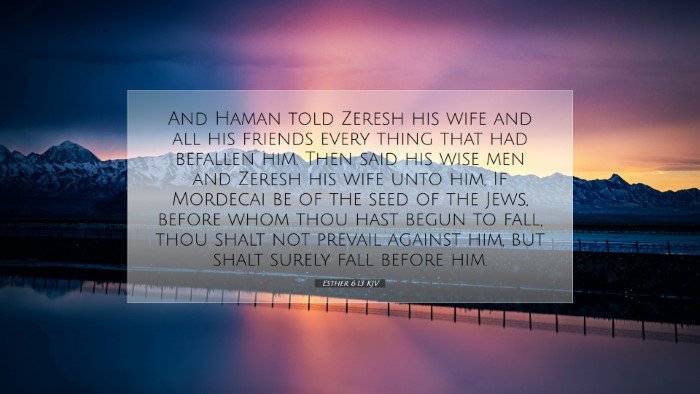Old Testament
Genesis Exodus Leviticus Numbers Deuteronomy Joshua Judges Ruth 1 Samuel 2 Samuel 1 Kings 2 Kings 1 Chronicles 2 Chronicles Ezra Nehemiah Esther Job Psalms Proverbs Ecclesiastes Song of Solomon Isaiah Jeremiah Lamentations Ezekiel Daniel Hosea Joel Amos Obadiah Jonah Micah Nahum Habakkuk Zephaniah Haggai Zechariah MalachiEsther 6:13
Esther 6:13 KJV
And Haman told Zeresh his wife and all his friends every thing that had befallen him. Then said his wise men and Zeresh his wife unto him, If Mordecai be of the seed of the Jews, before whom thou hast begun to fall, thou shalt not prevail against him, but shalt surely fall before him.
Esther 6:13 Bible Commentary
Commentary on Esther 6:13
Esther 6:13 states: "And Haman told Zeresh his wife and all his friends everything that had befallen him. Then his wise men and his wife Zeresh said to him, 'If Mordecai, before whom you have begun to fall, is of Jewish descent, you will not prevail against him, but will surely fall before him.'"
This verse is pivotal in the narrative arc of the book of Esther, presenting a moment of deep foreboding for Haman, the antagonist of the story. The commentary below integrates insights from significant public domain commentaries to elucidate various aspects of this scripture.
Contextual Analysis
Understanding Esther 6:13 requires a grasp of the preceding events. Haman, proud and ambitious, has just witnessed the downfall of his plans to execute Mordecai, who has been honored by the king. The king's unexpected promotion of Mordecai stands as a critical turning point, contrasting Haman's ego and his subsequent despair.
Historical Context
Esther, as a text, finds itself situated within the post-exilic period when the Jewish people were under Persian rule. This narrative reveals the tension between Haman, a high-ranking official, and Mordecai, a Jew who represents faithfulness to God amidst oppression. The clash reflects broader themes of power, identity, and divine providence.
Insights from Commentators
Matthew Henry
Henry reflects on the irony present in this section of the text. He notes that Haman, who had sought to destroy Mordecai, is now brought low by his own failed ambitions. In his commentary, Henry emphasizes the psychological torment Haman experiences as he shares his misfortunes with his wife and friends. Elizabeth Barrett Browning once opined that "the best way to gain a friend is to be one"; such friendship is notably absent for Haman in this moment of humiliation.
Albert Barnes
Barnes provides a thoughtful analysis on the shape of Haman's downfall. He writes that Haman's realization of Mordecai's descent and the implications of his Jewish heritage underscore the prophetic nature of the conflict. Barnes posits that Haman's wise men are not only reflecting on the situation but also indicating a recognition of the strength and right of Mordecai’s people. His comments create a parallel with the laws of nature and divine judgement, suggesting that those who rise against God's people can expect defeat.
Adam Clarke
Clarke delves into the philosophical discourse of identity encapsulated in this verse. He notes that Haman’s downfall is compounded by his wife and wise men’s recognition of the “Jewish descent” of Mordecai, which Clarke asserts holds a deeper theological implication. The acknowledgment of Mordecai’s identity as a Jew signifies God’s protective covenant towards His people, which Haman's own ignorance has failed to respect. Clarke's exposition encourages believers to recognize the sovereignty of God in human affairs.
Thematic Exploration
Folly of Pride
This moment encapsulates the biblical warning against pride and arrogance. Haman represents the archetype of hubris, and his counsel culminates in ridicule. His earlier decisions are birthed from a place of pride and entitlement, but in this admission of failure, we see the stark contrast to the humility displayed by Mordecai.
Identity and Heritage
In Haman's revelation that Mordecai is of Jewish descent, there is a broader commentary on the theme of identity. Haman’s fate serves as a cautionary tale about the consequences of underestimating the people of God. The Jewish identity here is not merely ethnic but underscored by a covenant relationship with God.
Divine Providence
This verse highlights the hand of divine providence in the affairs of men. While Haman is embroiled in self-pity, the unfolding events reveal God's sovereign plan for His people. It invites readers to consider the ultimate trajectory of those who oppose God's will—an assurance to faithful followers of God's enduring presence.
Practical Applications
- Excavating Pride: Pastors and theologians must address the uncomfortable truth that pride often precedes a fall. This should prompt self-examination and humility within our leadership roles.
- Affirmation of Identity: For students of theology, this verse underlines the importance of understanding one's identity in Christ, paralleling Mordecai’s Jewish identity with the believers’ identity as children of God.
- Recognition of Providence: The faithful should find solace in the assurance that God’s purpose will triumph even amidst seeming disasters. Haman’s narrative reinforces trust in divine timing and justice.
Conclusion
Esther 6:13 serves as a powerful reminder of the transitory nature of power and the certainties provided by faith in God. The insights derived from the combined commentaries offer a wealth of knowledge that speaks not only to the rich narrative of Esther but also to the moral and theological lessons that continue to be relevant for contemporary faith communities.


